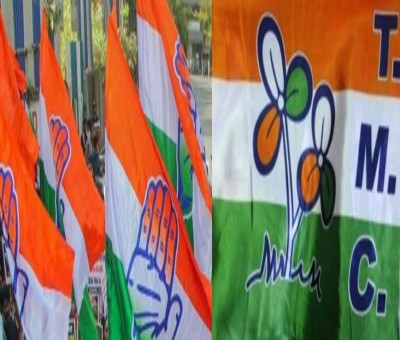
Shillong, The political status of the Congress, which governed Meghalaya for many years and that of the BJP, which is a partner in the Meghalaya Democratic Alliance (MDA) government, are very fragile due to various reasons. The Trinamool Congress (TMC), which dramatically became the states principal opposition force overnight, is now looking to grab the space left vacant by the Congress.
After 12 of the 17 Congress MLAs led by former Chief Minister Mukul Sangma (2010-2018) joined the TMC in November last year, the latter became the main opposition party in the 60-member assembly, elections to which are barely six months away.
The five remaining Congress MLAs, led by Ampareen Lyngdoh, had earlier announced to join the National People's Party-led MDA government.
Even though the NPP, headed by Chief Minister Conrad K. Sangma, is an important constituent of the BJP-led North East Democratic Alliance (NEDA) and the National Democratic Alliance (NDA), it's relations with the saffron party are gradually souring over various issues, specially after the arrest of BJP Meghalaya unit vice-president Bernard N. Marak, who was arrested from Uttar Pradesh on July 25 for allegedly running a brothel in the West Garo Hills district.
The BJP has two MLAs in the Meghalaya assembly.
BJP workers and leaders organised protests in Tura demanding a fair probe in Marak's case, while the party workers in West Garo Hills organised a signature campaign demanding the removal of the Superintendent of Police and Deputy Commissioner of the district.
In defence of Marak, BJP leaders claimed that the farmhouse in the brothel case has been operational since 2019, but the raid was carried out just six months prior to the Assembly elections in Meghalaya to malign Marak and to damage his political career.
In the backdrop of the changing political situation in the hill state, NPP supremo Sangma announced that his party will not have a pre pre-poll alliance with any party and will contest next year's assembly elections on its own, leading to confusion among the MDA allies -- UDP, PDF and HSPDP.
"The NPP has always contested polls on its own. We will not have a pre-poll alliance and this has been our stand in all elections and does not change this time too," Sangma said in Shillong.
Since party supremo and West Bengal Chief Minister Mamata Banerjee formed a full-fledged state committee, the Trinamool Congress has become more proactive in the state's politics, slamming the MDA government on many issues, including the inter-state border agreement with Assam, illegal coal mining and corruption.
The TMC's legislature party leader Mukul Sangma, state president Charles Pyngrope and other leaders are trying hard to dispel the notion that it is a "Bangla" party, in which everything will be controlled from Kolkata if it comes to power in Meghalaya, a Christian dominated state.
During his visit to Meghalaya in June to inaugurate the state party headquarters in Shillong, TMC's national general secretary Abhishek Banerjee had clarified: "Some people will try to project our party as a Bengali dominated party, but I want to announce firmly that Meghalaya would be governed by the people of the state and not by outsiders."
Meghalaya has three distinct regions -- Khasi Hills, Jaintia Hills and Garo Hills.
Eight of the 12 Trinamool Congress MLAs hail from Garo Hills and four of them are close relatives of Mukul Sangma. The party has three MLAs from Khasi Hills and one from Jaintia Hills.
Tribal dominated Meghalaya has 55 out of the 60 seats in the state Assembly reserved for the Scheduled Tribes confirming that the mountainous state is fully governed by the indigenous people.
In another significant aspect, the entire state, except the small area within Shillong, falls under the three powerful Tribal Autonomous District Councils, constituted under the Sixth Schedule of the Constitution that deals with grassroots and traditional governance and it empowers democratically elected grassroots institutions.
The ADCs deal with the matters of traditional customs, cultures, land, mineral resources, forest produce, traditional knowledge, academic and socio-economic issues under the autonomous council areas.
To provide further protection, since the past four decades there has been a huge demand for the extension of the Inner Line Permit under the Bengal Frontier Regulation Act 1873 and ahead of the elections the demand might become louder.
The Confederation of Meghalaya Social Organisations (CoMSO), an umbrella body of more than 17 organisations, since 2019 has been agitating for promulgation of the Inner Line Permit in entire Meghalaya.
If the ILP is enforced in entire Meghalaya, like in four other northeastern states -- Arunachal Pradesh, Nagaland, Mizoram and Manipur -- the state would keep itself out of the purview of the Citizenship (Amendment) Act (CAA).
The ILP is an official travel document that allows an Indian citizen to visit and temporarily stay in an ILP governed area for a limited period.
Political analyst Toki Blah said that it is too early to make any forecast on the assembly elections, expected to be held in February next year.
"The voting pattern in Meghalaya is individual-oriented or candidate centric, not party or organisation based. Before selection of the candidates by various parties, it is very hard to make any assessment on party lines," he said.
There is a matrilineal society in the hilly state, where in the 60-member assembly there are only four women lawmakers, three from the Congress and another belonging to the NPP elected to the assembly in the 2018 assembly polls.


.jpeg)

